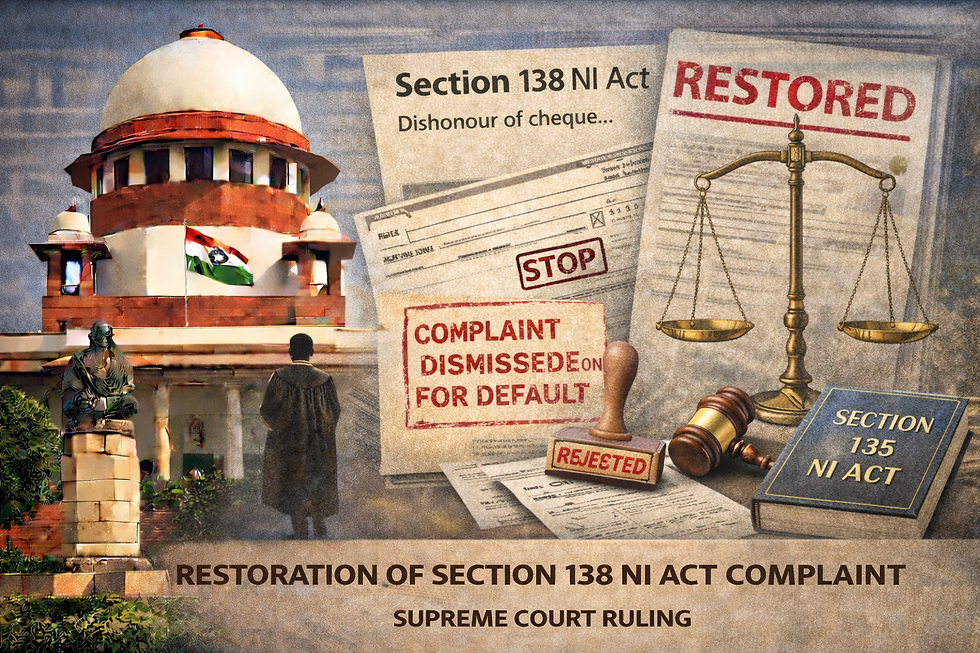The Power to Levy Taxes is a Sovereign Function: Analysing the Landmark NOIDA Toll Bridge Judgment
- Chintan Shah

- Dec 24, 2024
- 4 min read
Summary of the Judgment
Case Name: NOIDA Toll Bridge Company Ltd. vs. Federation of NOIDA Residents Welfare Association & Others
Date of Judgment: 20th December 2024
Bench: Hon'ble Justice Surya Kant
Advocates: Dr. Abhishek Manu Singhvi (for the appellant), Mr. Parthiv Goswami (for the respondents)
Acts and Sections Cited: Uttar Pradesh Industrial Area Development Act, 1976 (Sections 6A, 19); Constitution of India (Article 14); Concession Agreement clauses (notably Articles 13, 14)
Cited Judgments: Ramana Dayaram Shetty vs. International Airport Authority of India (1979), Kasturi Lal Lakshmi Reddy vs. State of Jammu and Kashmir (1980), Joshi Technologies International Inc. vs. Union of India (2015), and others
Introduction
The Supreme Court’s judgment in NOIDA Toll Bridge Company Ltd. vs. Federation of NOIDA Residents Welfare Association & Others stands as a critical precedent in matters relating to public-private partnerships, contractual obligations, and constitutional principles of fairness and non-arbitrariness. Delivered by Hon'ble Justice Surya Kant on 20th December 2024, the case scrutinized the propriety of toll collection by a private concessionaire and the validity of the underlying concession agreement. This analysis explores the key issues, findings, and implications of the decision.
Background of the Case
The origins of the dispute can be traced to the 1990s when the State of Uttar Pradesh, alongside NOIDA, partnered with Infrastructure Leasing and Financial Services Ltd. (IL&FS) to construct the Delhi-Noida Direct (DND) Flyway. This project, executed under a Build-Own-Operate-Transfer (BOOT) model, granted the NOIDA Toll Bridge Company Ltd. (NTBCL) the authority to levy tolls to recover project costs and ensure adequate returns on investment.
However, after several years of operation, the Federation of NOIDA Residents Welfare Association filed a public interest litigation (PIL) in the Allahabad High Court, arguing that NTBCL had already recovered its project costs and thus had no basis for continuing to collect tolls. The High Court held that Articles 13 and 14 of the Concession Agreement, which authorized the collection of tolls, were invalid, leading to NTBCL’s appeal before the Supreme Court.
Key Issues Before the Court
Maintainability of the PIL: Could a public interest litigation challenge the validity of a commercial contract like the Concession Agreement?
Delegation of Power: Did the Concession Agreement improperly delegate the authority to levy fees to a private entity?
Public Policy: Were the terms of the Concession Agreement, particularly regarding the calculation of returns and recovery of costs, contrary to public policy?
Recovery of Costs: Had NTBCL already recovered its project costs and reasonable returns?
Observations and Findings
1. Maintainability of the PIL
The Court upheld the maintainability of the PIL, emphasizing that the involvement of public funds and public interest justified judicial scrutiny. Hon'ble Justice Surya Kant remarked:
“Public interest litigations serve as a powerful tool to address grievances arising from government action or inaction. However, they must be bona fide and free from vested interests.”
The Court rejected NTBCL’s contention that the petition lacked locus standi and highlighted that Respondent No. 1, a registered welfare association, was acting in the interests of NOIDA residents.
2. Improper Delegation of Power
The Court found that the Concession Agreement exceeded statutory limits by delegating the authority to levy tolls. While Section 6A of the Uttar Pradesh Industrial Area Development Act allowed NOIDA to authorize private entities to collect fees, the power to levy such fees remained solely with NOIDA. The Court observed:
“The power to levy taxes or fees is a sovereign function. It cannot be delegated to a private entity without explicit statutory authority.”
This improper delegation rendered Articles 13 and 14 of the Concession Agreement invalid.
3. Contravention of Public Policy
The Concession Agreement’s formula for calculating the Total Project Cost and returns effectively transformed it into a perpetual arrangement. The Court criticized the lack of transparency and fairness, noting that escalating costs and fixed returns created an undue burden on the public. The judgment highlighted:
“The absence of a cap on costs and the assurance of high returns, irrespective of actual recovery, reveal a mechanism designed for unjust enrichment.”
4. Recovery of Costs
The Court relied on a report by the Comptroller and Auditor General (CAG), which revealed that NTBCL had already recovered substantial amounts, including inflated operation and maintenance expenses. The Court concluded that the continuation of toll collection was unjustified and detrimental to public interest.
Impact and Implications
a) Public-Private Partnerships (PPP):
This judgment underscores the importance of transparency, accountability, and public interest in PPP projects. Private parties must operate within the bounds of statutory authority, and agreements must avoid clauses that disproportionately benefit private entities at the expense of the public.
b) Judicial Review of Contracts:
The case reaffirms that contracts involving public authorities are subject to judicial review, especially when public funds and welfare are at stake. As the Court noted:
“Every governmental action, including contracts, must align with constitutional principles of fairness and non-arbitrariness.”
c) Role of Oversight Bodies:
The judgment highlights the critical role of oversight bodies like the CAG in ensuring financial propriety in public projects. The detailed findings of the CAG report were instrumental in the Court’s decision.
Conclusion
The Supreme Court’s ruling in this case serves as a landmark in safeguarding public interest within the framework of PPP projects. By invalidating arbitrary provisions and ensuring accountability, the judgment reinforces the principle that public welfare must remain paramount in all governmental actions. Legal professionals and policymakers must draw lessons from this case to craft agreements that are equitable, transparent, and firmly rooted in constitutional values.



Comments